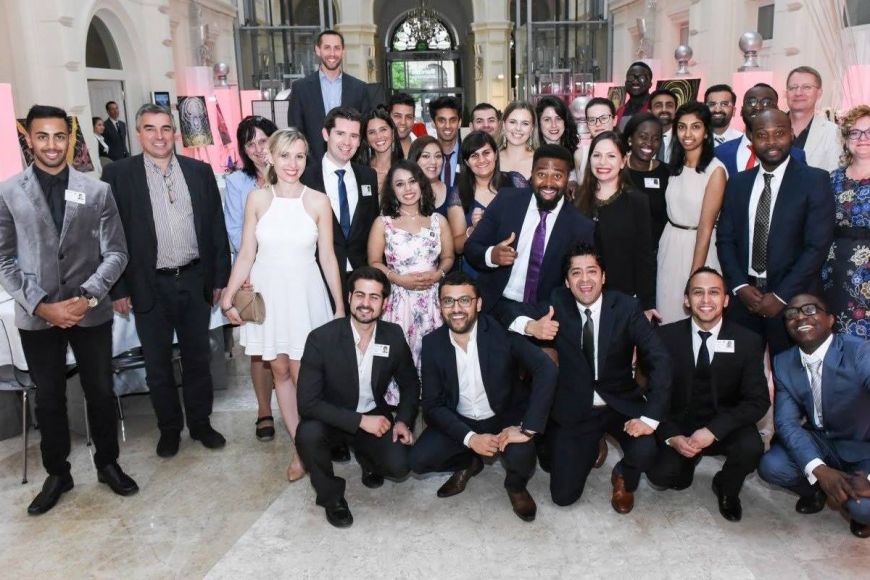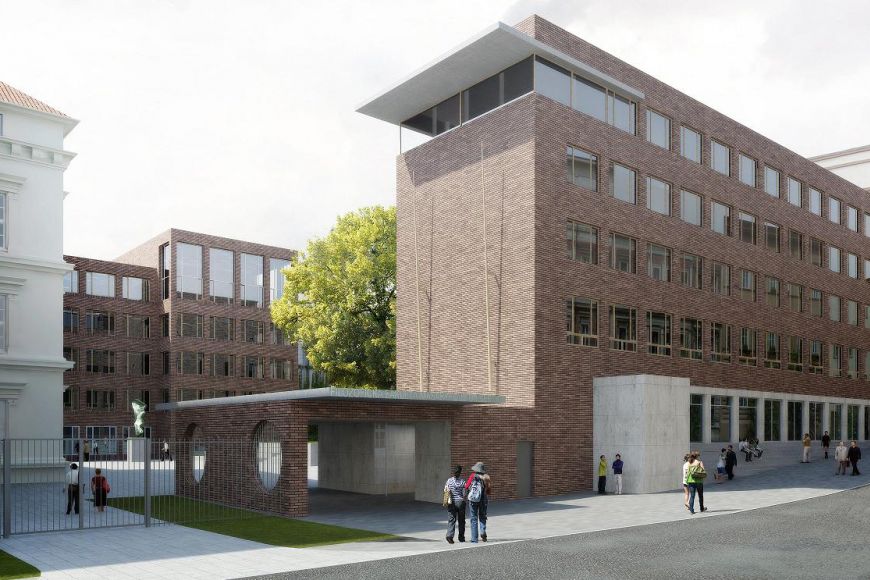Last year saw big changes, not only for Masaryk University but for the Czech university education system as a whole. After years of discussion and hard negotiations between Czech schools and officials, the Amendment to the Higher Education Act was adopted. But what else happened at Masaryk University in 2016? Read all this and much more below. Find the links to the full articles below the headlines.
Ceitec gets millions to work with the best in Europe
Projects offer great opportunities for PhD students. It will be possible to go for an exchange abroad or work with a mentor.
Examining the causes of various diseases, developing medicines and medical diagnostics, researching new nanomaterials for biosensors. In the coming years these will be the areas that Ceitec MU research teams will focus on. Through collaboration with excellent partners, they want to get to the top in Europe in these areas of research.
First alumni reunion attracts doctors from around the world
In the middle of June 2016, a group of Masaryk University alumni came back to Brno.

More than thirty graduates of English-language degree programmes in Dentistry and General Medicine visited the Czech Republic at the invitation of the MU Faculty of Medicine, which brought them to the Barceló Brno Palace for the first reunion of alumni of English-language medical programmes.
Most of the doctors came to Brno from abroad, notably the UK, where they work or are completing further studies in medicine.
Major building work starts at Faculty of Arts
Major building work has already begun at the main campus of Masaryk University’s Faculty of Arts on Arne Novák Street, near Brno’s city centre.

In the coming months faculty buildings will change dramatically including a facelift for the Faculty entrance from Arne Novák Street and a comprehensive rebuild for D building. Tuition will begin in the new buildings in autumn 2018.
Masaryk University opens new shop with clothing and books
A collection of Masaryk University merchandise including T-shirts, stationery, hooded tops and books published by Masaryk University Press will soon be available at a new MU gift shop in the foyer of the Scala University Cinema. You will find the new MU shop in the foyer of the Scala University Cinema on Moravské náměstí from 20 September.
Forecasting cancer recurrence, in a test tube... for now
Nobody wants to receive the news that a cancer that seemed to have been cured has now returned. Unfortunately, this does happen – but a discovery by experts from the Faculty of Medicine Masaryk University could change that. With the help of a new type of microscope, a team led by Michal Masařík can tell, at least in laboratory conditions, if prostate cancer treatment has been effective and the cancer cells have died, or if they are going to come back in a form even more insidious than before.
MU researchers monitor pro-Kremlin websites to show how modern propaganda worksPolitical propaganda is not what it used to be. It has significantly changed in tone, a new analysis of Czech pro-Kremlin websites shows. With the support of the think-tank Evropské hodnoty (European Values), Masaryk University researchers have tracked articles published by four Czech websites, including the relatively well-known news portal Parlamentní listy (Parliament News).
Research data show that the monitored websites no longer rely on straightforward publicity and adoration. Their propaganda is more sophisticated than that, and it does not respect basic ethical principles of journalism. According to the researchers, such propaganda is therefore becoming more dangerous.
Ceitec offers Down syndrome testing
The new test is performed at the beginning of pregnancy using the mother’s blood. This means that unlike the commonly used tests, it is non-invasive and almost 100% reliable.
Down syndrome is among the most common genetic disorders caused by an incorrect number of chromosomes. Standard tests performed between the first and the second trimester of pregnancy can result in false-positive results, causing many women to be worried about the health of their babies. Ceitec MU was recently accredited to offer a new and non-invasive test of three fetal genetic disorders to those who are interested.
European universities stress importance of continued collaboration after Brexit
University leaders from 24 European countries, including Germany and France, have signed a joint statement to stress the importance of continued European university collaboration following the UK's vote to leave the EU. Among the first representatives who signed the statement was the Czech Rectors Conference.
University scientists record the highest-ever temperature in Antarctica
The scientific team from the Department of Geography, Faculty of Science at Masaryk University (MU), which is currently studying climate on James Ross Island, have recorded the highest-ever air temperature in Antarctica. The record-breaking temperature is 17.8 °C (60.04 °F) and was recorded in the afternoon of 23 March 2015 in the summit area of the Davies Dome glacier. This is the location of an automatic weather station that monitors weather conditions and the properties of the glacier’s surface.

The station is only serviced once a year, which is why the recorded data was only recently retrieved when another expedition arrived at the island.
MU Cyber Team awarded Ministry of Interior Prize and now looking for new colleagues
In November 2016, the Czech Ministry of the Interior awarded IT experts at Masaryk University a special prize for the Cybernetic Proving Ground project.
The project, known as the Cybernetic Polygon, provides security training which shows how critical infrastructure can be defended against hackers. In a virtualised environment security experts simulate sophisticated attacks without threatening the security of real systems of critical infrastructure, which include banks, wireless service providers, power plants and energy companies. Now the team is planning new projects and so looking to expand.
Those interested in working with the MU Cyber Team should send an email to This email address is being protected from spambots. You need JavaScript enabled to view it. and join the security group now.
Czech lessons attract people from 38 countries to Brno
The Summer School of Slavonic Studies has attracted over 130 students to Brno. They spent four weeks studying Czech.
Faculty of Arts receives thousands of books from German art historian
The Department of the History of Art at the Faculty of Arts, Masaryk University, opened the new Hans Belting Library in April 2016. The new library, named after the German art historian of worldwide renown, was made possible thanks to a donation from Hans Belting himself, who sent his collection focusing on medieval and Byzantine art to Brno. The Faculty of Arts thus became one of the best-equipped places in Europe for the study of the medieval Mediterranean.

Thousands of books collected by the 80-year-old Belting and his ex-wife over the major part of their lives will now be made available for students and researchers in the library.
Masaryk University botanists discover a singular gingko
A very special specimen of Ginkgo biloba has been discovered by researchers from the Department of Botany and Zoology, Faculty of Science at Masaryk University. By chance, they found that one of the several seedlings of this tree, grown in the faculty’s botanical garden, has four sets of chromosomes rather than the usual two.

This tetraploid, as such specimens are called, is absolutely unique in the world of gingkos and their relations the cycads, while potentially capable of providing more of the active substances used, for example, in nutritional supplements.
University establishes first International Scientific Advisory Board
University has established the first International Scientific Advisory Board (ISAB) in its almost hundred-year history. The members, four respected and experienced scientists from prestigious European universities, will advise Masaryk University on scientific and research strategies. The experts will also play a crucial role in the process of independent evaluation and consultation on scientific issues.
Members of the Board include Josef Jiřičný, Thomas A. Henzinger, Marie-Janine Calic and Peter Williamson, top world scientists in the given fields.
Breakthrough discovery in animal navigation
The idea that animals navigate using the geomagnetic field first appeared as early as in the 19th century. Research in birds and bees then started in the 20th century. Martin Vácha, a biologist from the Faculty of Science, has recently made a major contribution to our understanding of this phenomenon by proving that cryptochrome, an already known protein found in, among other places, animals’ eyes, serves to detect the geomagnetic field and changes in its direction.
While this had been suspected for some time, the evidence shown by the Brno researchers, who were working in cooperation with their colleagues from České Budějovice, is a breakthrough discovery confirming the role of cryptochrome in magnetoreception. The findings of the project funded by the Czech Science Foundation were published in the Proceedings of the National Academy of Sciences of the United States of America.
